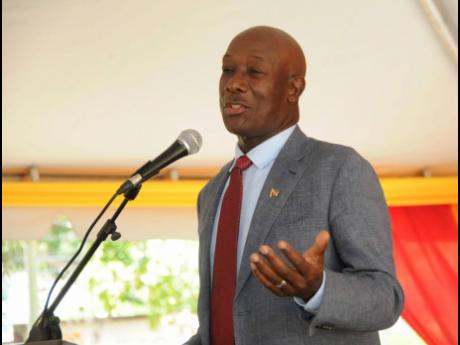Elizabeth Morgan | CARICOM’s 32nd Intersessional Meeting of Heads: Key issues – COVID containment and economic recovery
CARICOM heads are now having, virtually, their 32nd Intersessional Meeting (February 24-25), chaired by Prime Minister Keith Rowley of Trinidad and Tobago.
Looking back at the 31st Heads Intersessional Meeting held in Barbados in February 2020, before the declaration of the global pandemic, and chaired by Prime Minister Mia Mottley, the focus was on CSME implementation and reviving regional economies.
For the 41st Regular Session of Heads in October, in the midst of the pandemic, and chaired by Prime Minister Ralph Gonsalves of St Vincent and the Grenadines, the focus was on containing the virus and on the economic recovery (building back better and greener), which had to be linked to implementing the CSME and the UN Sustainable Development Goals (UN SDGs).
THE AGENDA
For this 32nd Intersessional Meeting, the preoccupation is with securing COVID vaccines, which is linked to containing the virus and to economic recovery. Prime Minister Rowley, in his address at the start of his chairmanship, did say that this should be the year of the CSME; actually, it is a significant anniversary. So, basically, for me, the key issues on this meeting’s agenda, which I have not seen, are: containing the COVID virus and securing and applying adequate quantities of vaccine, and the economic recovery, which must mean progress reports on a Caribbean Economic Recovery and Transformation Plan, a joint tourism policy, the status of overall CSME implementation, and the functioning of the CARICOM Private Sector Organisation.
The economic and political situation in Haiti must also be on the agenda as a continuing concern. Given the state of affairs in the region and the world, I am quite concerned about the economic situation in this region going forward.
SECURING VACCINES
This is now a major issue as it is seen as the route to containing the virus and returning to normality, sparking economic recovery. I assume that each CARICOM country, with the Caribbean Public Health Agency (CARPHA), has a COVID plan. Vaccines are rolling out and being approved, but the issues are the short supply and unequal distribution. Due to the generosity of the Government of India, some vaccines are now in CARICOM member states and more are to come through the COVAX Facility and the African Medical Council platforms. As we await vaccines and vaccinations, adhering to the protocols remain necessary as, realistically, some of us cannot cope with more lockdowns.
In the past week, there have been some interesting developments in which emphasis has been on vaccine availability:
CARICOM has continued its call for a World Health Organization (WHO) high-level meeting on vaccine supply inequity; at the OAS, CARICOM member states sponsored a resolution on vaccine availability; CARICOM and Canada foreign ministers met; the G7 Summit was held, and there was a CNN Op-Ed by PM Keith Rowley and the WHO director general, Dr Tedros Ghebreyesus.
The UN secretary general, António Guterres, in an address to the Security Council, made it clear that access to vaccines has been wildly uneven and unfair. He called for funding of the COVAX facility and a global vaccination plan. The G7 have pledged to work together to strengthen the WHO, accelerate global vaccine development and deployment, and to increase financing. They have heard; they have pledged; hopefully, they will all deliver.
Italy is now the chair of the G20 and will be hosting the Global Health Summit in May. The World Economic Forum should also be having a formal session in May, and the United Kingdom should be convening the long-postponed Caribbean Forum meeting. We will see what happens in the next three months.
MIDDLE-INCOME STATUS
In the quest for vaccines, CARICOM has been hampered, it seems, by its World Bank classification as mostly high and upper middle-income countries. This means only a limited amount of vaccines can be obtained through donations and at concessionary rates. Vaccines must be bought in a time of economic crisis at commercial rates. Inflows of foreign exchange are low for many of the member states with the continuing economic stagnation exacerbated by decline in tourism and other exports.
Over the years, there have been proposals for development partners and financial institutions to reconsider their policy of graduating middle- income countries (MICs), like those in CARICOM, from development financing. Many of these countries are highly indebted and still need development support given the fragility of their economies. The matter of a Universal Vulnerability Index was considered at the 41st Meeting of CARICOM Heads.
I have been wondering whether enough has been done to advance proposals in support of the MICs. For CARICOM, COVID has been highlighting the many areas on which the region should have made greater progress over the last 20 years.
20TH ANNIVERSARY OF THE REVISED TREATY
The Revised Treaty of Chaguaramas establishing the Caribbean Community, including the CARICOM Single Market and Economy, was signed by Heads on July 5, 2001. This year, the 42nd Conference of CARICOM Heads should be marking the 20th anniversary. The assessment of achievements is not encouraging and, indeed, COVID-19 has surely exposed the regional failings in CSME implementation and cooperation.
Will this, indeed, be the year for committed action on CSME implementation arising from COVID-19’s wake-up call to the region?
Elizabeth Morgan is a specialist in international trade policy and international politics. Email feedback to columns@gleanerjm.com

